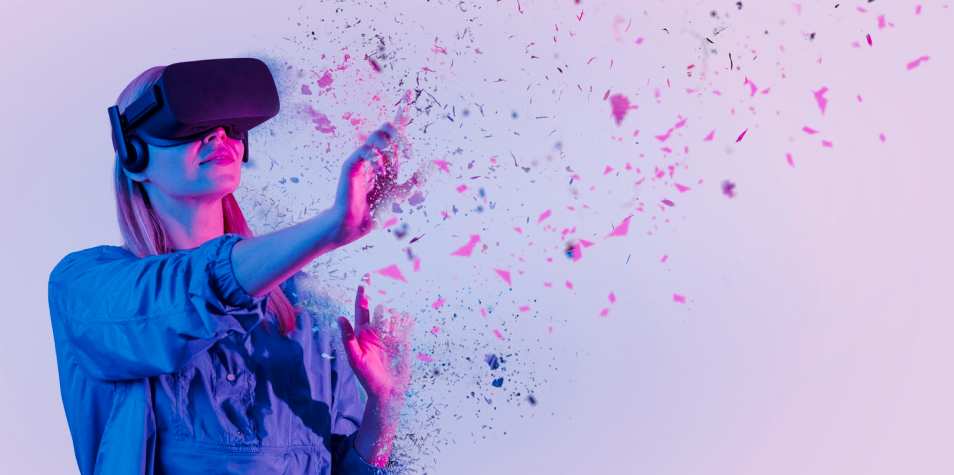Crafting Interactive and Immersive Experiences with Virtual Reality: A New Era in Marketing
In the ever-evolving world of digital marketing, brands are constantly looking for innovative ways to capture their audience’s attention and foster a deeper connection with them. Traditional marketing tactics like print ads, television commercials, and social media posts are still effective, but there’s a new player in the game – Virtual Reality (VR). Creating immersive virtual reality experiences for marketing purposes is revolutionizing how brands engage with consumers, offering unparalleled levels of interaction, engagement, and personalization.
At NetConnect Digital Agency, we are committed to staying ahead of the curve, and embracing VR for marketing has proven to be a game-changer. By crafting interactive and immersive experiences, VR has allowed brands to transcend the limitations of traditional marketing, opening up a world of possibilities for creativity and innovation. But how exactly can VR elevate marketing efforts? Let’s explore how creating immersive virtual reality experiences for marketing purposes is reshaping brand-consumer relationships and driving measurable results.
What is Virtual Reality and Why Does it Matter for Marketing?
Virtual Reality is a simulated experience that can be similar to or completely different from the real world. Unlike augmented reality (AR), which overlays digital elements onto the real world, VR creates an entirely immersive environment where users can interact with 3D worlds using specialized hardware like VR headsets and controllers.
For marketers, creating immersive virtual reality experiences for marketing purposes allows brands to transport customers into captivating environments, where they can experience products, services, or even entire brand worlds in ways that were once unimaginable. VR breaks down the barriers of traditional advertising, offering users an experience that not only informs but engages them on a deeper level.
The Power of Immersive Experiences in Marketing
The key to effective marketing today is engagement. Consumers are overwhelmed with content, and it’s getting harder for brands to stand out. The rise of VR addresses this challenge by creating experiences that capture the imagination and keep users engaged for longer periods.
1. Increased Engagement and Retention
Creating immersive virtual reality experiences for marketing purposes taps into the human desire for novelty and adventure. Studies have shown that VR experiences lead to longer engagement times. According to a report by PwC, VR experiences can increase consumer engagement by 33%, with consumers spending more time interacting with brands. The emotional connection formed during a VR experience is also stronger compared to other forms of marketing. This emotional bond can help foster brand loyalty and turn first-time buyers into repeat customers.
2. Enhanced Product Visualization
One of the most powerful applications of VR in marketing is the ability to let consumers experience a product in its entirety before making a purchase decision. For example, in the real estate sector, VR is helping potential buyers take virtual tours of homes without ever leaving their current location. This not only saves time but provides a much clearer view of the property than static photos or videos.
Case Studies of Virtual Reality in Marketing
The impact of VR in marketing isn’t just theoretical; there are numerous real-life examples that highlight its effectiveness. Let’s take a look at a few case studies where brands have successfully integrated VR into their marketing strategies.
Case Study 1: IKEA – Virtual Reality in Furniture Shopping
IKEA, the Swedish furniture giant, took a bold step into VR by launching its “IKEA VR Experience.” This immersive experience allowed customers to virtually walk through fully furnished rooms and even customize the furniture within the space. The result? Increased interest in its products and an overall better shopping experience. In fact, a survey revealed that 71% of consumers said they would be more likely to buy from IKEA after using the VR experience.
Key Takeaway: By creating immersive virtual reality experiences for marketing purposes, IKEA allowed consumers to visualize products in their homes before making a purchase, increasing customer satisfaction and driving sales.
Case Study 2: Mercedes-Benz – Virtual Reality Test Drives
In a groundbreaking marketing campaign, Mercedes-Benz used VR to allow potential buyers to experience a test drive from the comfort of their homes. In partnership with an agency, they developed a 360-degree VR experience where users could test drive their cars in scenic locations, exploring the car’s features in real-time.
The results were impressive: 60% of users who participated in the VR test drive were more likely to consider purchasing a Mercedes-Benz, compared to those who experienced traditional advertising methods. This VR campaign also won several awards for creativity and innovation in marketing.
Key Takeaway: VR can be an effective tool for creating memorable experiences that not only engage consumers but also influence their purchase decisions.
Case Study 3: The North Face – Virtual Reality for Adventure Marketing
Outdoor gear retailer The North Face took its brand marketing to the next level by using VR to give consumers an immersive experience of hiking in the wild. They set up VR stations in their retail stores, where customers could virtually experience some of the world’s most breathtaking hiking trails, such as Yosemite National Park. This allowed The North Face to directly connect its customers to the adventure they sell, fostering an emotional connection that enhanced their brand perception.
Key Takeaway: VR enables brands to build a stronger emotional bond with their audience by immersing them in the brand’s story and values.
Key Benefits of Creating Immersive Virtual Reality Experiences for Marketing Purposes
- Increased Brand Awareness: By offering an interactive and unique experience, VR generates buzz and increases the likelihood of media coverage. VR also creates memorable experiences that customers are more likely to share, increasing word-of-mouth marketing.
- Better Consumer Insights: VR allows brands to collect valuable data on how users interact with their products or services. This data can be used to improve future marketing efforts and enhance customer satisfaction.
- Enhanced Storytelling: Traditional ads rely on static images or video, but VR provides a platform for immersive storytelling. By placing customers in the heart of a brand’s narrative, VR enables deeper connections and more meaningful engagement.
- Cost-Effective: Although the initial investment in VR technology may seem high, the long-term benefits far outweigh the costs. VR allows brands to scale campaigns, engage consumers remotely, and gather valuable insights, all while saving on the cost of physical setups or large-scale productions.
The Future of VR in Marketing
Creating immersive virtual reality experiences for marketing purposes is not a fleeting trend—it’s the future of advertising. As VR technology continues to evolve, more and more businesses are adopting it as a core component of their marketing strategies. The ability to offer personalized, interactive experiences will continue to drive customer engagement and ultimately lead to better conversion rates and stronger brand loyalty.
At NetConnect Digital Agency, we believe that the power of VR lies in its ability to transport audiences into a world where imagination and innovation blend seamlessly with branding. By harnessing the potential of VR, your brand can create experiences that captivate, engage, and convert customers like never before.
Conclusion
Incorporating virtual reality into your marketing efforts is no longer a futuristic concept—it’s happening right now. From improving customer engagement and enhancing product visualization to building stronger emotional connections with your audience, the possibilities are endless. Creating immersive virtual reality experiences for marketing purposes is the next big leap in digital marketing, offering opportunities for brands to stand out, build loyalty, and ultimately drive growth.
If you’re ready to explore the exciting world of VR and how it can transform your marketing strategy, NetConnect Digital Agency is here to help you every step of the way.





